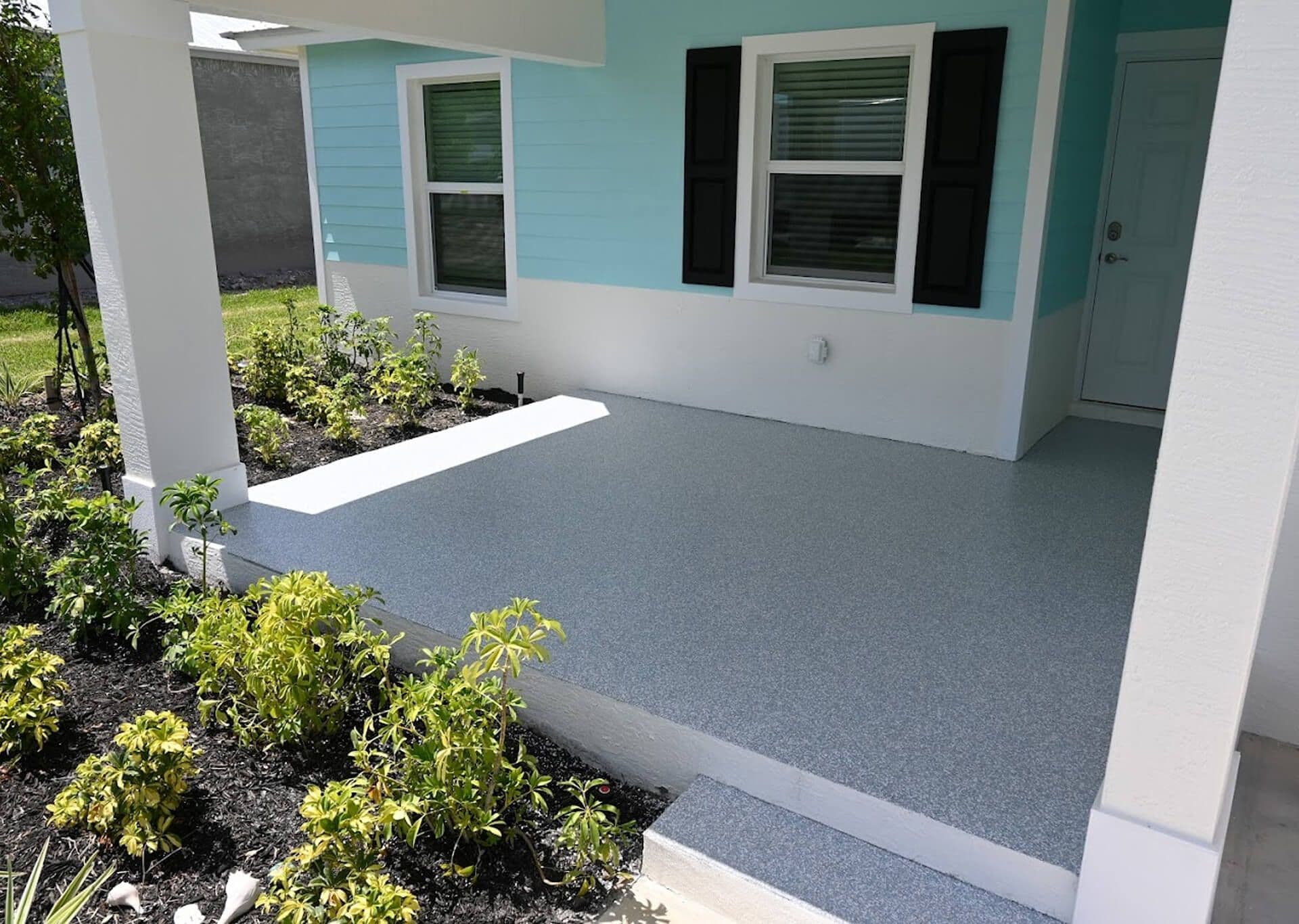Polyaspartic vs Epoxy vs Polyurea: The Best Floor Coating for Florida, Alabama & Detroit Weather

When considering the polyaspartic, epoxy, and polyurea debate for your garage or concrete floor, it can feel like a complex decision. As a homeowner in Florida, Alabama, or the Detroit area, you face unique challenges that require more than just a superficial solution. You deal with intense humidity, blistering sun, and in the north, the damaging cycle of ice and road salt. Here at Floortek, with our extensive experience and understanding of these conditions, we’ve seen firsthand how the wrong floor coating fails. We want to walk you through the options, clear up the confusion, and show you why our advanced polyaspartic system is the only long-term solution for your home.
Your floor is an investment, and you deserve to understand exactly what you’re putting on it. Many companies will offer you a bare epoxy floor because it's an older, more common technology. However, we believe in educating you, our neighbors, so you can make a choice that will bring you happiness for decades, not just a few years. Let’s break down the real-world performance of these three coatings.
The Problem with Traditional Epoxy Coatings
For years, epoxy has been the go-to for garage floors. It’s a two-part system that hardens into a solid, often glossy surface. It can look great right after it's installed, which is why it became so popular. However, for homeowners in our service areas, from the sunny shores of Stuart, Florida, to the heart of Birmingham, Alabama, and up to the harsh climate of Detroit, epoxy reveals its weaknesses quickly.
The primary issue we encounter with epoxy is its sensitivity to sunlight. Epoxy contains chemical compounds that are not stable when exposed to ultraviolet (UV) rays. Over time, this exposure causes the coating to amber or turn a yellowish color. In a place like Florida, where your garage door might be open for hours, a bright gray or tan floor can appear faded and yellowed in a surprisingly short time. It completely ruins the clean, pristine look you paid for.
Another significant drawback is its rigidity. Epoxy cures into a rigid, non-flexible plastic. While this sounds strong, it’s a weakness when applied to concrete. Concrete naturally expands and contracts in response to changes in temperature. In Detroit, this happens dramatically between summer and winter. This movement puts stress on the rigid epoxy, leading to hairline cracks, chipping, and eventually, widespread peeling. This is especially true when hot tires from your car sit on the surface, causing the epoxy to soften and peel up—a phenomenon known as hot-tire pickup.
Finally, epoxy is very sensitive to moisture during installation. High humidity, a constant factor in Alabama and Florida, can prevent the epoxy from curing and bonding correctly to the concrete. This leads to a weak bond that can bubble, blister, and fail prematurely. The long cure time of 2 to 5 days also means your garage is out of commission for nearly a week, a significant inconvenience for any busy family. While it might seem like a good initial choice, epoxy wasn't designed to withstand the specific environmental pressures we face. This is why we confidently say our system is 10X better than epoxy.
Understanding Polyurea: A Step Forward with Flaws
As the problems with epoxy became more apparent, the industry looked for better solutions. This led to the rise of polyurea coatings. A polyurea floor is a more advanced and flexible option than an epoxy floor. It’s known for its incredible durability and speedy cure time. It's the material used in demanding applications, such as spray-on bed liners for trucks and industrial containment linings.
The benefits of polyurea flooring are clear. It offers superior flexibility, allowing it to move with the concrete during temperature fluctuations, which dramatically reduces the risk of cracking and peeling. It's also much more resistant to chemicals and abrasion than epoxy. For homeowners seeking a “polyurea floor coating near me,” it appears to be the perfect solution.
However, there’s a critical drawback to standard polyurea for residential applications: its cure time. A typical polyurea system can become solid in under 30 seconds. While this is great for industrial equipment, it's a nightmare for a garage floor installation. Installers have to work impossibly fast, often resulting in roller marks, bubbles, and an uneven finish. There is not enough time to properly work the material and ensure a smooth, beautiful surface. This rapid cure also prevents the coating from deeply penetrating the pores of the concrete, which can compromise the long-term bond. So, while the polyurea floor material itself is rigid, the application is incredibly challenging to get right, resulting in an inconsistent product. The Critical Discussion: Polyaspartic vs Epoxy vs Polyurea
This brings us to the core of the polyaspartic vs epoxy vs polyurea comparison. We’ve established that epoxy is an outdated technology prone to yellowing and peeling. We know that standard polyurea is a step up in durability, but it can be challenging to apply correctly in a residential setting. This is where polyaspartic coatings come in, offering the ideal solution that takes the best of polyurea and perfects it.
The Floortek Solution: Why Our Polyaspartic System Is Superior
A polyaspartic is technically a type of polyurea, but it’s been chemically modified to solve the application problems of its parent material. Think of it as the next generation—engineered for perfection. At Floortek, we exclusively use our proprietary polyaspartic system because it delivers all the benefits of industrial-grade polyurea with none of the drawbacks.
Here’s why our polyaspartic floor coating is the undisputed winner for your home:
100% UV Stability: Our polyaspartic formula is completely stable in sunlight. It will not yellow or fade over time, even with constant exposure to the intense Florida sun. The color you choose is the color it will stay, keeping your garage looking fresh and clean for years. You can see the vibrant, lasting results in our Gallery.
Ready to transform your garage or concrete floor? Contact us today for a free quote and experience the difference our polyaspartic system can make in your home.
Unmatched Durability and Flexibility: Our system provides all the flexibility and strength of industrial polyurea. It moves with your concrete to prevent cracking and is formulated to withstand heavy impacts, abrasions, and chemicals like oil, gasoline, and road salt. This is essential for the wear and tear of a Detroit winter. Our polyurea concrete coatings are built to last.
Superior Adhesion: Our polyaspartic coating is specifically designed to penetrate deeply into the pores of the concrete, creating a permanent chemical bond that is significantly stronger than the topical bond of epoxy. It can be applied in a wide range of temperatures and is not affected by the high humidity found in Alabama and Florida, ensuring a successful installation year-round. This deep bond is what prevents hot-tire pickup and peeling.
Our system is Lab-Formulated for Durability, providing a solution that is truly 10 times better than Epoxy. When you choose Floortek, you select a scientifically engineered floor specifically designed for the unique challenges of your region.
The Floortek Process: It’s More Than Just the Material
A superior product is only as good as its installation. This is a fact that many companies overlook. The most crucial step in any floor coating project is preparing the concrete surface. Without proper preparation, even the best coating will fail to perform effectively. This is a cornerstone of our philosophy at Floortek; you can learn more about our commitment on our About Us page.
Our installation process is meticulous and proven:
Concrete Grinding: We don’t acid wash or lightly sand the floor. We use industrial-grade diamond grinders to remove the top layer of concrete. This eliminates any old stains, failing sealers, or surface contaminants. More importantly, it opens up the pores of the concrete, creating a textured profile that our polyaspartic basecoat can deeply penetrate and bond to. According to the U.S. General Services Administration, grinding is a critical step for preparing concrete for resurfacing.
Repairs and Patching: We meticulously repair any cracks, pits, or spalling in your concrete to ensure its durability and longevity. We don't just fill them; we rebuild the damaged areas to ensure a perfectly level and stable foundation for the coating.
Pigmented Polyaspartic Basecoat: We apply our 100% solids polyaspartic basecoat, ensuring a high-quality finish. This layer sinks into the prepared concrete, creating that unbreakable bond we discussed.
Full Broadcast of Decorative Flake: While the basecoat is still wet, we broadcast a complete layer of your chosen decorative vinyl flakes until the floor is completely covered. This provides the color, texture, and added thickness that make the floor so durable. You can explore our wide range of Colors and Flake options to find the perfect look for your home.
Scraping and Topcoat Application: After the basecoat has cured, we scrape away the excess flake to achieve your desired texture, and then apply our crystal-clear, UV-stable polyaspartic topcoat. This final layer locks everything in, providing that easy-to-clean, chemical-resistant, and incredibly durable finish.
This entire process is typically completed in just one day, giving you a beautiful, functional floor with minimal disruption. It’s a testament to the efficiency of both our product and our highly trained teams.
Your Local Experts in Florida, Alabama, and Detroit
We are proud to serve our local communities. We understand that a homeowner in Detroit has different concerns than one in coastal Florida. Our teams are trained to assess the specific needs of your concrete and climate, delivering a perfect result every time. Whether you’re looking for a “polyurea garage floor coating near me” in the suburbs of Detroit or a durable solution for your patio in Birmingham, we are your local experts.
We provide Manufacturer-Direct Value, cutting out the middleman to give you the best possible product. And we stand behind our work with a Life-of-the-Home Warranty, giving you complete peace of mind.
Ready to see the Floortek difference? Contact us for a Free Quote!
For service in Florida, call: (772) 758-7215
For service in Alabama, call: (205) 476-3232
Contact us if your area is not listed, and we will do our best to assist you. Need a custom solution? Contact us for a free consultation!
Limited-Time Offer for New Customers!
To help you make the best choice for your home, we are currently offering a 30% discount on first-time installations! This is the perfect opportunity to upgrade your space with a premium Floortex floor coating that will last. Don’t settle for a failing epoxy floor when you can have a superior polyaspartic system installed in a single day.
For a deeper dive into our offerings, you can view Our Coating Products. And if you’re a contractor interested in offering this superior technology to your clients, we invite you to learn more and Become A Dealer.
Frequently Asked Questions (FAQs)
1. What is the main difference in the polyaspartic vs epoxy vs polyurea debate?
The main difference lies in chemistry and performance. Epoxy is a rigid, UV-sensitive material that can yellow and crack over time. Polyurea is highly flexible, but it cures too fast for a clean residential application. Polyaspartic is an advanced, UV-stable form of polyurea engineered with a manageable cure time, resulting in a flawless, durable finish.
2. Is polyaspartic better than epoxy for a garage floor?
Yes, absolutely. Polyaspartic coatings are far superior to epoxy. They are 100% UV stable, so they won't turn yellow. They are more flexible, which prevents cracking and peeling. Additionally, they can be installed in just one day.
3. How long does a polyaspartic floor coating last?
With proper installation, a polyaspartic floor from Floortek is a permanent solution. That’s why we back it with our Life-of-the-Home Warranty. It is designed to last for as long as you own your home.
4. Can you apply a polyaspartic coating over an existing epoxy floor?
No, we would never apply our system over a failing epoxy coating. The integrity of the new floor depends entirely on its bond with the concrete. We always start by mechanically grinding the concrete to remove any existing coatings and ensure a permanent bond.
5. Why is a one-day installation better?
A one-day installation minimizes disruption to your life. With an epoxy system, your garage could be unusable for up to a week. Our polyaspartic system allows you to have your space back for light foot traffic in just a few hours and ready for your vehicle the very next day.
6. Will a polyaspartic floor crack in the cold Detroit winters?
No. Our polyaspartic system is designed to remain flexible even in cold temperatures. This allows it to expand and contract with the concrete during freeze-thaw cycles without cracking, which is a common point of failure for brittle epoxy coatings.
7. Does the humidity in Florida or Alabama affect the installation?
The high humidity in the South can cause significant issues for epoxy installations, resulting in bubbling and poor adhesion. Our polyaspartic system, however, is specifically formulated to perform exceptionally well in humid environments, ensuring a strong and reliable bond.
8. What makes the Floortek system different from other polyaspartic coatings?
Our difference is in our proprietary, lab-formulated materials and our meticulous installation process. We provide Manufacturer-Direct Value on a system perfected over years of experience, and our certified installers are experts in surface preparation, which is the key to a floor that lasts.
9. In the comparison of polyaspartic vs epoxy, which is easier to clean?
Polyaspartic coatings are much easier to clean. They form a non-porous surface that resists staining from oil, gas, and other chemicals. Spills can be easily wiped up without leaving a trace, unlike epoxy, which can tarnish over time.
10. How do I get a quote for a polyaspartic floor?
Getting a quote is simple and free. You can call us directly at our Florida or Alabama office or fill out the contact form on our website. One of our experts will provide you with a detailed, no-obligation estimate for your project.
FREE In-Home Estimate
Plus 30% Off

